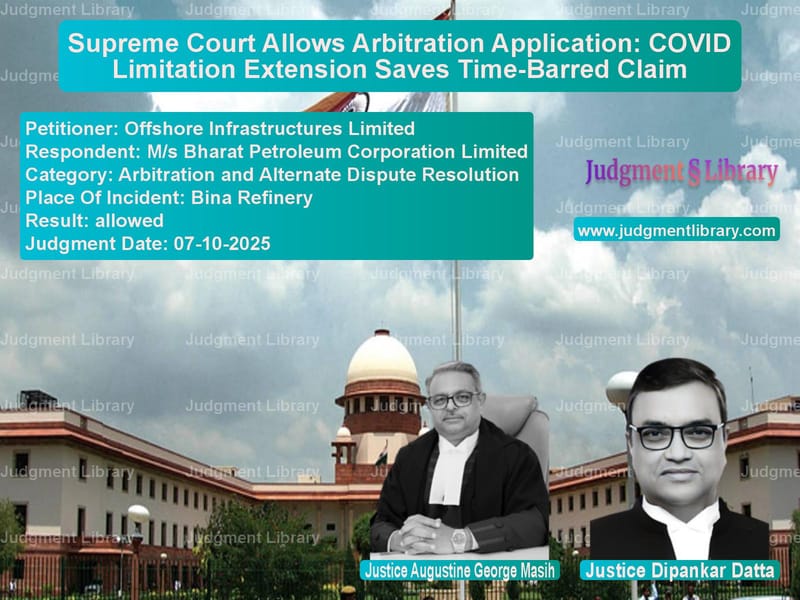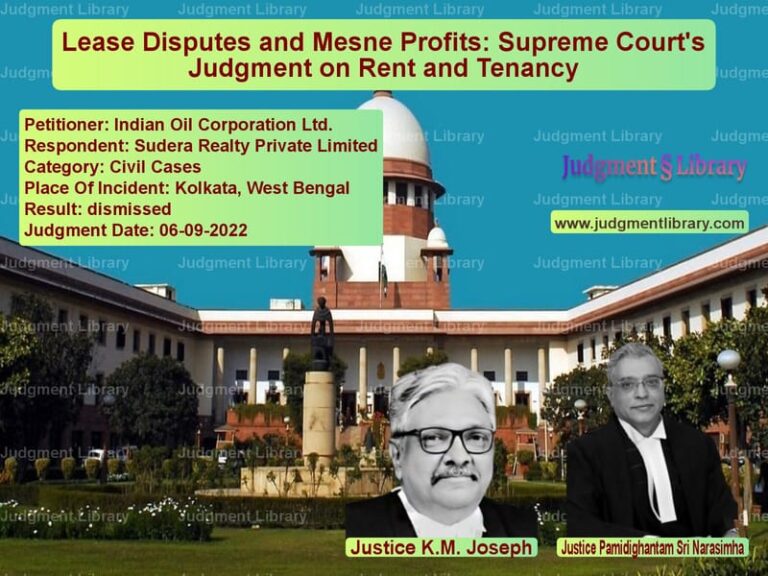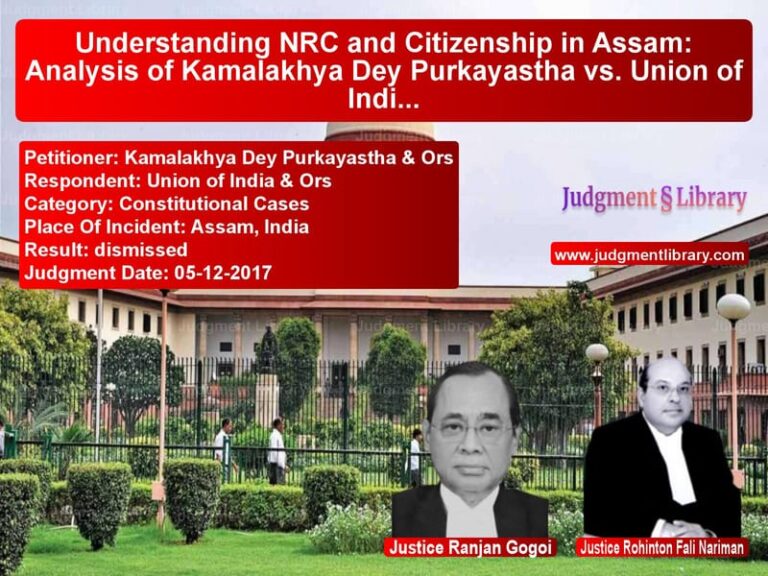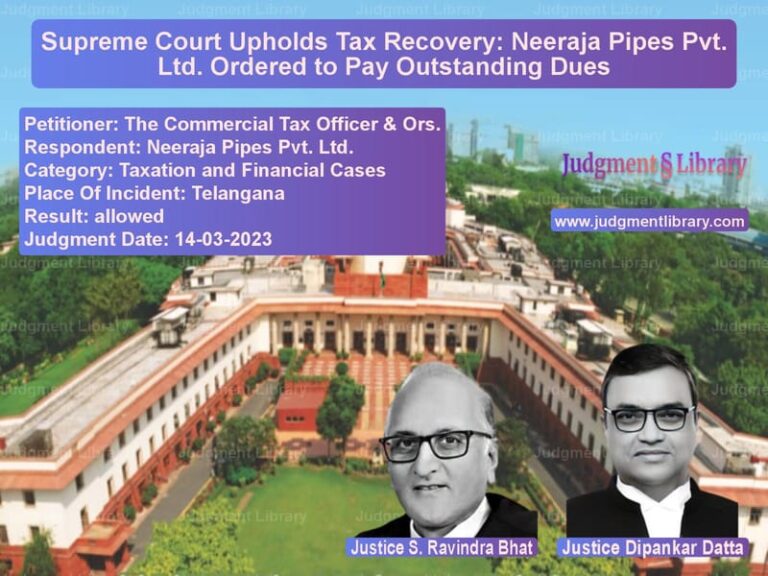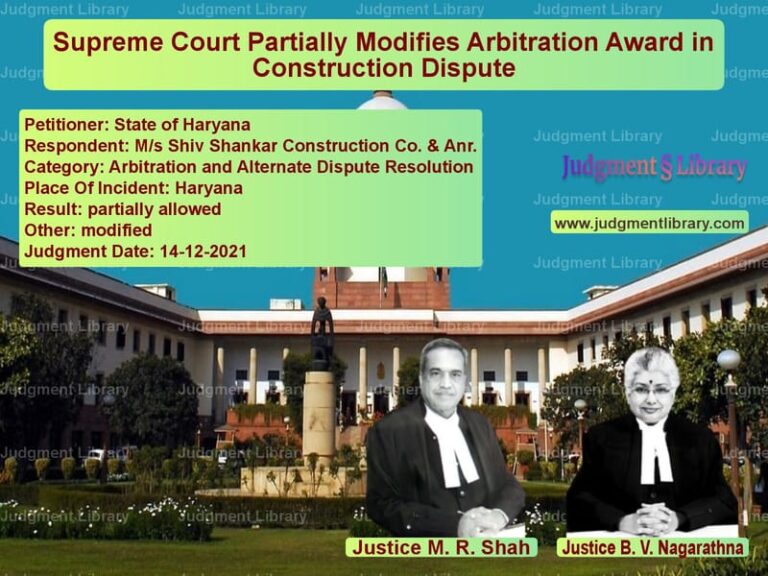Supreme Court Allows Arbitration Application: COVID Limitation Extension Saves Time-Barred Claim
In a significant judgment that balances contractual rights with statutory amendments and pandemic-era considerations, the Supreme Court of India has allowed an arbitration application that was initially dismissed as time-barred by the Madhya Pradesh High Court. The judgment, delivered on October 7, 2025, by a bench comprising Justice Augustine George Masih and Justice Dipankar Datta, provides crucial clarity on the interplay between arbitration agreements, limitation periods, and COVID-19 related extensions.
The case involved Offshore Infrastructures Limited and Bharat Petroleum Corporation Limited (formerly Bharat Oman Refineries Limited). The dispute originated from a contract awarded to Offshore Infrastructures for executing composite works pertaining to the establishment of a new Modular Pencx Unit along with associated works required for the revamp and capacity enhancement at the Bina Refinery. The work was awarded via letter of acceptance dated December 31, 2016, with an initial completion period of five months ending on May 30, 2017.
However, the project faced delays and was ultimately completed on January 31, 2018. The appellant raised the final bill on March 20, 2018, and issued a “No Claim Certificate” on October 3, 2018. The completion certificate was issued on February 5, 2019, and the final bill was released on March 26, 2019. The respondent released part payment on June 11, 2019, while deducting 5% as liquidated damages for the delay. The appellant issued a consolidated claim for all outstanding dues on April 26, 2021.
The crucial legal battle began when the appellant issued a notice on June 14, 2021, to the Managing Director of the respondent for appointment of an arbitrator as per Clause 8.6 of the General Conditions of Contract. The notice stated that as per Clause 8.6 of GCC, the Arbitrator named is Managing Director of Bharat Oman Refineries Limited or an officer of Bharat Oman Refineries Limited who may be nominated by the Managing Director, however, in view of the provisions of the 1996 Act (as amended by Act 3 of 2016, w.e.f. 23.10.2015), neither the Managing Director nor an officer is entitled to act as an Arbitrator in the matter, therefore suggest names of at least four qualified persons unconnected with either party to be selected as Sole Arbitrator in the matter. The respondent refused to entertain the claims via communication dated July 2, 2021.
Aggrieved by this refusal, the appellant filed Arbitration Case No. 23 of 2022 under Section 11(6) of the Arbitration and Conciliation Act, 1996 before the High Court seeking appointment of a sole arbitrator. The High Court dismissed the application as time-barred, holding that the limitation period started from the date of issuance of the “No Claim Certificate” on October 3, 2018, and the application filed on March 14, 2022, was beyond the three-year limitation period.
Before the Supreme Court, the learned Counsel for the Appellant submitted that the application under Section 11(6) of the 1996 Act was filed well within the period of limitation. To substantiate his contentions, reliance is placed upon the decision of this Court in Arif Azim Company Limited v. Aptech Limited, which held that the period for the purpose of filing application for appointment of arbitrator commences only upon issuance of a valid notice invoking the arbitration followed by refusal or failure of the other party to appoint the arbitrator in accordance with agreed procedure. He further submitted that even if it is assumed that the cause of action accrued earlier on 03.10.2018, the part payment made by the Respondent on 11.06.2019 has extended the period of limitation under section 19 of the Limitation Act, 1963. Relying upon In Re: Cognizance for Extension of Limitation, he submitted that the limitation is covered by the COVID-19 extension Order dated 10.01.2022 passed by this Court, which excluded the period from 15.03.2020 to 28.02.2022 from computation of limitation.
Per contra, the learned Counsel for the Respondent while supporting the Judgment and Order of the High Court submitted that the cause of action accrued to the Petitioner on the date when final bill was raised on 20.03.2018, and according to the Appellant amount became due on or before 21.04.2018 i.e. 30 days from the date of submission of bill. The Appellant ought to have invoked arbitration within three years from 21.04.2018 by filing an application which was not done. He further contended that categorial stipulation contained in Clause 8.6 (a) of GCC empowers the Managing Director or his nominee alone to act as Sole Arbitrator, as subsequent legislative changes in the 1996 Act through amendments renders such a contractual provision otiose and inoperative, thereby such arbitration clause ought to be deemed to have ceased to exist. Therefore, the arbitration mechanism itself stands effaced, disentitling the Appellant to invoke arbitration.
The Supreme Court addressed two key issues: whether the court has power to appoint an arbitrator when the clause providing the arbitration mechanism has become bad in law pertaining to certain statutory amendments, and whether the application under Section 11(6) of the Arbitration and Conciliation Act, 1996 filed by the Appellant is within the period of limitation.
On the first issue, the court referred to its decision in Perkins Eastman Architects DPC and Another v. HSCC (India) Limited, wherein a coordinate Bench of this Court while following the decision in TRF Limited v. Energo Engineering Projects Limited categorically held that once the Chairman and Managing Director of the respondent therein became ineligible by the virtue of Section 12(5) read with the Seventh Schedule of the 1996 Act (as amended by Act 3 of 2016 w.e.f. 23.10.2015), the ineligibility also extends to power of nomination, thereby rendering any appointment made by him legally unsustainable. Similarly, in Voestalpine Schienen GmbH v. Delhi Metro Rail Corporation Limited this Court underscored that the legislative intent behind the 2015 amendment of inserting Section 12(5) of the 1996 Act is to secure neutrality of arbitrators.
The court firmly rejected the respondent’s contention that the arbitration clause had become obsolete. The very existence of the arbitration clause in the GCC referring to all disputes to arbitrator is the core part of contract. Merely because the procedure to appoint an arbitrator provided in the clause has become inoperative due to subsequent changes in statutory provisions, would not mean that the core of the contract referring the dispute for adjudication to arbitrator would be rendered nugatory. The amendment in the statute has been enacted with the legislative intent to enforce neutrality of the arbitrator and bring impartiality in arbitration proceedings by virtue of Section 12(5) of the 1996 Act. It cannot be justified to literally interpret the clause in the contract in a manner or at the cost of the entire arbitration mechanism itself being abandoned. The arbitration agreement must be interpreted in a purposive manner, but not literally so as to enable the parties to pursue the intended dispute redressal mechanism of contract.
On the limitation issue, the court referred to Geo Miller and Company Private Limited v. Chairman, Rajasthan Vidyut Utpadan Nigam Limited, where a three-Judge Bench of this court while dealing with similar issue has held that the cause of action in respect of arbitration application arises when the final bill handed over to the respondent becomes due, and further correspondences between the parties subsequent to the due date of bill would not extend the time of limitation. In the present case, the final bill was raised by the Appellant on 20.03.2018 and the amount became due on 21.04.2018 i.e. 30 days from the date of submission of bill, as submitted by the Appellant. The period of limitation to file an application under section 11(6) 1996 Act would start from 21.04.2018 and an application for appointment of arbitration ought to be filed within three years from such date i.e. on or before 21.04.2021.
However, the court applied the COVID-19 limitation extension, referring to Order dated 10.01.2022 of this Court in In Re: Cognizance for Extension of Limitation, where a three-Judge Bench of this Court has held that in view of COVID-19 pandemic period from 15.03.2020 till 28.02.2022 shall stand excluded for the purpose of limitation as may be prescribed under any general or special laws in respect of all judicial or quasi-judicial proceedings. The above decision came to be delivered by this Court considering the hardship faced by the people during COVID-19. It would be unjust and detrimental to not consider this while deciding upon the period of limitation in the present case. Therefore, the benefit of the period from 15.03.2020 to 28.02.2022 must be given to the Appellant and this period need to be excluded while counting the period of limitation for filing application for appointment of arbitrator. Once, this period is excluded, it can be concluded that the Appellant’s application for appointment of arbitrator under section 11(6) of the 1996 Act before the High Court was moved within the period of limitation.
The Supreme Court set aside the High Court’s judgments and directed that the matter shall stand referred to the Delhi International Arbitration Centre, which shall proceed to appoint an arbitrator, who shall decide the matter in accordance with law and rules, as applicable. This judgment reinforces the pro-arbitration stance of Indian courts while ensuring that technicalities don’t defeat substantive justice, especially during extraordinary circumstances like the COVID-19 pandemic.
Petitioner Name: Offshore Infrastructures Limited.Respondent Name: M/s Bharat Petroleum Corporation Limited.Judgment By: Justice Augustine George Masih, Justice Dipankar Datta.Place Of Incident: Bina Refinery.Judgment Date: 07-10-2025.Result: allowed.
Don’t miss out on the full details! Download the complete judgment in PDF format below and gain valuable insights instantly!
Download Judgment: offshore-infrastruct-vs-ms-bharat-petroleum-supreme-court-of-india-judgment-dated-07-10-2025.pdf
Directly Download Judgment: Directly download this Judgment
See all petitions in Arbitration Act
See all petitions in Commercial Arbitration
See all petitions in Contract Disputes
See all petitions in Dispute Resolution Mechanisms
See all petitions in Judgment by Augustine George Masih
See all petitions in Judgment by Dipankar Datta
See all petitions in allowed
See all petitions in supreme court of India judgments October 2025
See all petitions in 2025 judgments
See all posts in Arbitration and Alternate Dispute Resolution Category
See all allowed petitions in Arbitration and Alternate Dispute Resolution Category
See all Dismissed petitions in Arbitration and Alternate Dispute Resolution Category
See all partially allowed petitions in Arbitration and Alternate Dispute Resolution Category

